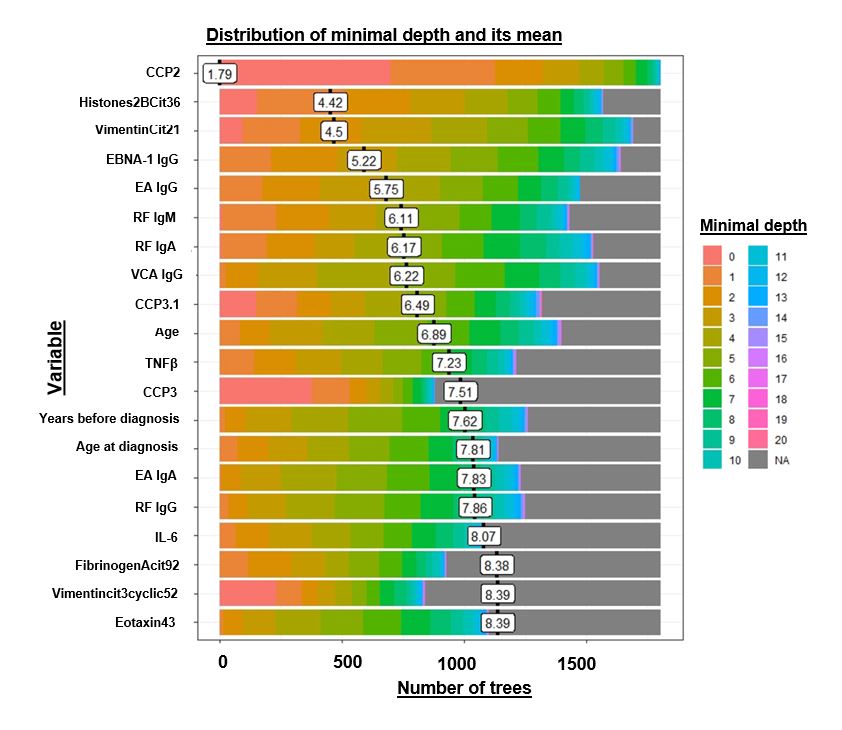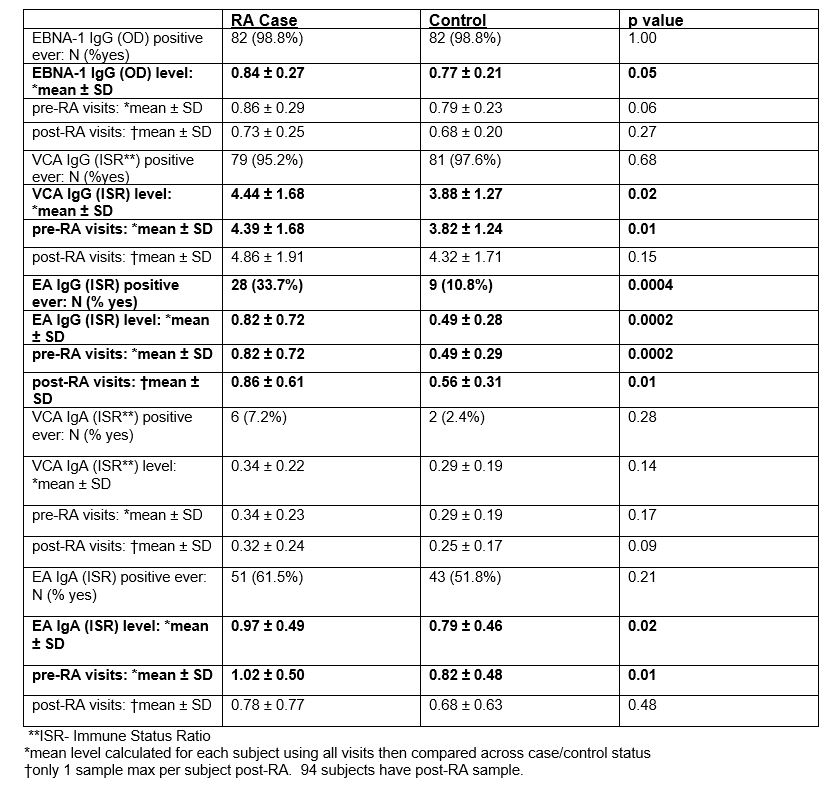Session Information
Session Type: Poster Session B
Session Time: 9:00AM-11:00AM
Background/Purpose: Viral infections, including infection with Epstein-Barr virus (EBV), have been suggested as environmental risk factors for rheumatoid arthritis (RA). EBV infections are known to be nearly ubiquitous in adults, life long, and asymptomatic. EBV infection status has been determined using circulating levels of IgG antibodies to Epstein Barr viral capsid antigen (VCA), nuclear antigen 1 (EBNA-1), and early antigen (EA). Prior studies have shown that patients with established RA have altered immune responses to EBV; however, the presence and role(s) for this altered immune response has not been fully understood in the autoantibody positive early period before clinically apparent RA develops. We hypothesize that EBV infection, as evidenced by an altered anti-EBV antibody response in preclinical RA, can play an important role in driving the expansion of RA-related autoimmunity.
Methods: 83 subjects had a date of RA diagnosis established by chart review and stored serum samples available through the Department of Defense Serum Repository (DoDSR) that include the pre and post RA diagnosis period based on 1987 ACR criteria. Controls (n=83) were matched to RA cases based on age, race, sex, region, and timing of blood draw. Subjects’ sera were tested for 5 anti-EBV antibodies (EBNA-1-IgG, VCA-IgG, EA-IgG, VCA-IgA, and EA-IgA), 7 RA-related autoantibodies (RF-neph, -IgA, -IgM, -IgG, CCP2, CCP.3, CCP3.1), 22 cytokine/chemokine markers, and 36 APCAs. Random forest classification modelling included pre-selected biomarkers based on bivariate association with RA case versus control outcome using Mann-Whitney test (p< 0.20). Mixed models were used to estimate the earliest time point when the case’s least-squares mean estimate was significantly higher than the control estimate for each marker. The time when an RA subject’s marker level was outside the upper 95% CI for their matched control was also identified. These times were compared across each maker using an analysis of variance to identify the mean time that each case differed from their control and how the mean time of each antibody relates to the others in time.
Results: Random forest analysis identified anti-EBNA1 IgG, EA-IgA, EA-IgG, and VCA-IgG among the top 20 important RA-related preclinical markers based upon mean minimal depth in trees and gini decrease importance measures that classify RA cases from controls (figure 1). Results of serologic analyses showed that EBNA-1 IgG levels are significantly higher in RA cases, whereas EA-IgA and VCA-IgG levels are significantly higher overall and in the pre-diagnosis period (table 1). Mixed modeling analysis of anti-EBV antibody levels identified the earliest divergence of EA IgG, EBNA-1 IgG, and VCA IgG levels between cases and controls are at 8.3, 3.5, and 1.9 years prior to RA diagnosis respectively. The difference in the timing of these case/control mean biomarker level differences is significant between each antibody and each group.
Conclusion: Our study suggests that several anti-EBV antibody levels are significantly elevated in the preclinical time of RA. In addition, altered EBV antibody titers suggests that this virus may contribute to a specific endotype of preclinical RA.
 The distribution of minimal depth for the top 20 significant variables among the trees of the forest is shown in different colors for each value of minimal depth. The mean minimal depth for each variable is marked by a vertical black bar and labeled with the mean depth inside the box. The lower the mean minimal depth of a variable the more important the variable is in classification of RA cases and controls.
The distribution of minimal depth for the top 20 significant variables among the trees of the forest is shown in different colors for each value of minimal depth. The mean minimal depth for each variable is marked by a vertical black bar and labeled with the mean depth inside the box. The lower the mean minimal depth of a variable the more important the variable is in classification of RA cases and controls.
 Table 1: Anti-EBV Antibody Levels in Cohort
Table 1: Anti-EBV Antibody Levels in Cohort
To cite this abstract in AMA style:
Fechtner S, Berens H, Bemis E, Demoruelle M, Guthridge C, Harley J, James J, Edison J, D. Deane K, Norris J, Holers V. Antibody Responses to Epstein-Barr Virus Are Altered in the Pre-Clinical Period of Rheumatoid Arthritis [abstract]. Arthritis Rheumatol. 2020; 72 (suppl 10). https://acrabstracts.org/abstract/antibody-responses-to-epstein-barr-virus-are-altered-in-the-pre-clinical-period-of-rheumatoid-arthritis/. Accessed .« Back to ACR Convergence 2020
ACR Meeting Abstracts - https://acrabstracts.org/abstract/antibody-responses-to-epstein-barr-virus-are-altered-in-the-pre-clinical-period-of-rheumatoid-arthritis/
